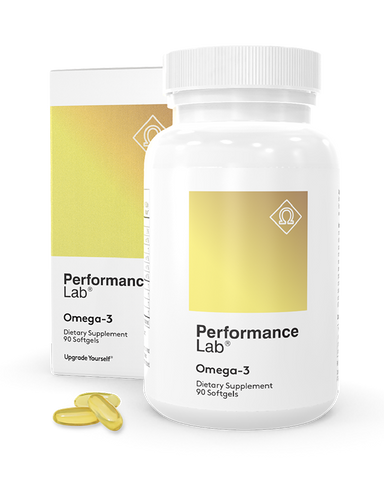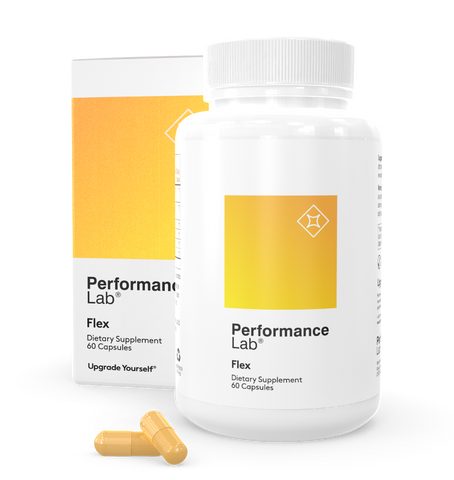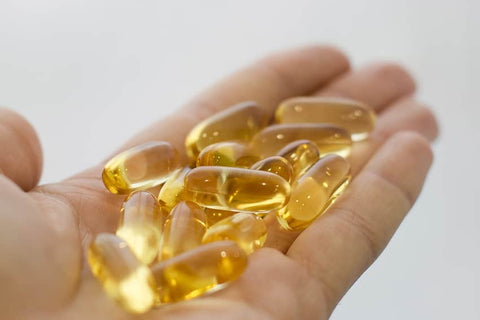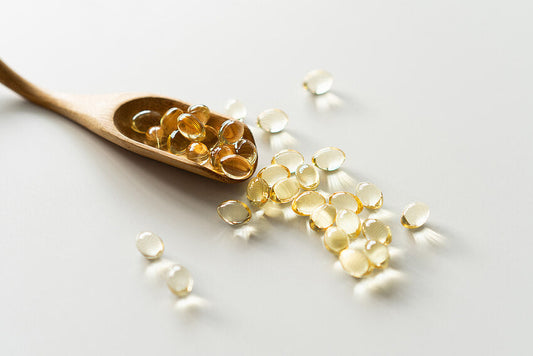For several decades, the word “fat” was treated by many health and nutrition enthusiasts without any nuanced distinction between “good” fats and “bad” fats. Which is a shame because the “good” fats are not just good for you but are, in fact, really, really good for you.
Required for the formation of cell membranes and the proper functioning of multiple health systems, these beneficial fats are not something you want to totally remove from your diet for the sake of “burning off excess fat.”
Counterintuitively, such fats may actually benefit your fat-burning, energy-producing metabolism—not to mention your cognitive health, cardio health, reproductive health, and so on.
Such beneficial fats include the Omega-3 fatty acids, more specifically docosahexaenoic acid (DHA) and eicosapentaenoic acid (EPA).
Odds are you’ve heard of omega-3s, and odds are you’ve been told by a friend a time or two to “get more omega-3s in your diet.”
Perhaps you’ve even offered such advice to your friends. Many people do this, as it’s widely known that “omega-3s are good for you”… but what exactly do they do?
What are the specific health and fitness benefits of supplementing omega-3s? What’s the best type of omega-3 supplement? And, more specifically, should men take an omega-3 supplement?
In this guide on the Omega-3 Benefits for Men, we answer these questions and more, including an in-depth breakdown of the best omega-3 supplement for men: Performance Lab® Omega-3.
So, let’s get started!
The Ultimate Guide on Omega-3 for Men
Some supplements get all the attention, namely those that provide immediate boosts on energy and workout performance, whereas others that are more essential and foundational to one’s health and fitness tend to take the backburner in many people’s minds.
Though virtually everyone knows that “omega-3s are good for you,” few people share the same excitement for omega-3 supplements as they do for, say, a stim-powered pre-workout supplement or an awesome chocolate-flavored protein powder.
To be fair, nothing quite competes with chocolate-flavored protein powders. Yet, all the same, omega-3s are fundamental to one’s health, not to mention the sexiness of one’s complexion.
However, to understand how omega-3s are fundamental to one’s health and complexion, we need to first understand what exactly omega-3s even are. So, let’s continue reading and find out.
What Are Omega-3 Fatty Acids?
Found in “fatty” fish and certain seeds, omega-3s are a class of beneficial fatty acids involved in virtually every health system in the body. The three main omega-3 fatty acids include:
- Alpha-Linolenic Acid (ALA) – an 18-carbon fatty acid that converts into DHA and EPA once consumed and metabolized.
- Docosahexaenoic Acid (DHA) – a 22-carbon fatty acid that’s particularly important to the development, growth, and function of the brain.
- Eicosapentaenoic Acid (EPA) – a 20-carbon fatty acid that helps produce eicosanoids, which help regulate inflammation.
Whereas ALA tends to be found in many plant oils, such as flaxseed oil and canola oil, DHA and EPA are typically found in fish and other seafood oils.
In fact, it’s the richness of DHA and EPA in fatty fish sources that’s partly responsible for the wide-ranging health and longevity benefits associated with seafood-heavy diets, such as those of the Mediterranean and Japan.
Omega-3s comprise an important component of the membranes that help form every cell in your body. In the brain and eye, omega-3 fatty acid concentrations are especially high—and, for men, omega-3s are also important to one’s sperm quality.
Ideally, it’s best to acquire your daily omega-3s via natural food sources, due to the other various healthy essential nutrients found in fatty fish and seeds.
But, of course, in areas where seafood is sparse or hard to come by, omega-3 supplementation may significantly help improve one’s omega-3 levels.
Omega-3 vs. Omega-6 vs. Omega-9: Which is Better?
Like omega-3s, both omega-6 and omega-9 fatty acids are also important to one’s overall health and fitness. Yet, while all provide their own distinct health benefits, it’s important to consume them in correct proportions.
Because the Western diet tends to overprioritize omega-6s over omega-3s, most Westerners would perhaps do better to reduce their omega-6 intake—or to at least achieve a ratio balance between 1:1 and 4:1 omega-6 to omega-3.
This ensures that the anti-inflammatory benefits of omega-3s aren’t outweighed by the pro-inflammatory effects of omega-6s.
Whereas omega-3s and omega-6s are essential polyunsaturated fatty acids, omega-9s are monounsaturated and somewhat “unessential,” meaning your body can produce them.
However, while it’s better to focus on omega-3s in one’s diet, consuming omega-9 fatty acids may help regulate one’s inflammation and insulin sensitivity.
Top Food Sources of Omega-3
Typically, when we think of “healthy fat” foods, we think of oily, cold-water fish. This partly explains why regions with the highest average lifespan tend to be in areas with easy access to seafood and/or prioritize seafood as a cultural dietary staple.
With that in mind, the top food sources of omega-3 include:
- Mackerel
- Salmon
- Cod
- Sardines
- Anchovies
- Herring
- Oysters
- Caviar
- Flax Seeds
- Chia Seeds
- Walnuts
- Soybeans
- Eggs
- Fortified Foods
This includes natural food sources. Many omega-3 supplements that aren’t necessarily “food” but still qualify as natural typically obtain their omega-3s from fish oil, krill oil, cod liver oil, or (the clean, vegan option) algal oil, a “healthy fat” sourced from algae.
How Does Omega-3 Work?
Comprising the cell membrane, omega-3 fatty acids fundamentally assist with the formation of some of the basic units of organic life. Without omega-3s, life as we know it would be completely different, likely regressing us back to the unorganized “primordial soup” of pre-pre-prehistory.
Granted, while we’re not necessarily at risk of suddenly losing our structure and melting into a formless mass of aminos and proteins, omega-3 deficiency does highlight the structural importance of this class of beneficial fatty acids.
Essentially, omega-3 fatty acids work by assisting with:
- Cell Barrier Performance—omega-3s help with the selective permeability of cell membranes, which allow beneficial substances to enter cells while preventing access to harmful toxins.
- Cell-to-Cell Communication—the structure and surface of cell membranes is important to the efficiency of cell-to-cell communication and neural synapses, including the transmission of neurotransmitters and hormones.
- Immune Regulation—in addition to their regulation of inflammatory processes, omega-3s help regulate and manage the signaling compounds and enzymes involved in the body’s immune responses.
By forming and supporting cell membrane structure and function, omega-3s optimize the health and function of multiple body systems, including those important to male health.
Should Men Take an Omega-3 Supplement?
As essential fatty acids, omega-3s can’t be produced by the body and must be consumed to maintain adequate levels. So, that alone should help explain why practically everyone should increase their omega-3 intake.
For men in particular, omega-3s do provide distinct advantages, namely in the areas of anabolic muscular metabolism and reproductive health (i.e., sperm quality).
If you’re taking other health and fitness supplements to improve your exercise performance and masculine health, supplementing omega-3 may also help maximize the absorption of the fat-soluble ingredients those formulas, enhancing the overall benefits of your daily supplement stack.
Omega-3 Benefits for Men
Essential to the flexibility, permeability, and all-around function of cell membranes, omega-3 fat acids docosahexaenoic acid (DHA) and eicosapentaenoic acid (EPA) are two nutrients you do not want to be deficient in.
Especially where male health and performance are concerned, increasing your daily omega-3 intake may significantly improve various aspects of your overall fitness.
Supplementing your diet with omega-3s may help elevate health and performance mainly in the following body systems:
1| Nervous System
Omega-3 fatty acids, namely DHA, help comprise the brain cell membrane, assisting with the formation, development, and repair of nervous tissue.
During the adolescent growth and development of the central nervous system (CNS), omega-3s are especially important.
However, for adults, too, omega-3s have been linked by clinical research to improvements in attention, processing speed, and memory recall under conditions of mild cognitive impairment.
Especially when paired with fat-soluble nootropics and cholinergic cognitive enhancers, omega-3 may significantly help improve one’s cognitive performance and overall brain health—not to mention ocular health, due to the similarly high concentration of DHA in the eyes.
2| Cardiovascular System
In addition to cognitive health, much of the research on omega-3s tend to also focus on the cardiometabolic benefits of omega-3 supplementation.
Researchers have suggested that both DHA+EPA may help the cardiovascular system by:
- Enhancing circulation and heart rhythm stability
- Maintaining healthy triglyceride levels in the blood
- Keeping blood pressure levels within a normal range
The well-documented advantages of supplementing omega-3 on the cardiovascular system are reason enough for many men to add omega-3s to their diet.
3| Musculoskeletal System
Whereas DHA gets all the attention for its importance to brain health, EPA seems particularly geared towards protecting a pro-anabolic, anti-catabolic metabolism within muscle tissue.
For healthy, exercising men, omega-3 supplementation may assist with muscular health and growth by stimulating muscle protein synthesis (MPS), improving neuromuscular function and resistance to fatigue, and reduce exercise-induced muscle damage and soreness.
4| Reproductive System
One of the more underappreciated benefits of omega-3 supplementation involves the effects of omega-3s on male fertility and sperm quality.
In a 2019 systematic review and meta-analysis on the effect of omega-3 fatty acids on male infertility, a group of researchers compiled the clinical data on omega-3’s interaction with various sperm parameters, including total sperm concentration, sperm motility, sperm DHA, and sperm plasma DHA concentration in subfertile men.
The conclusion of the meta-analysis indicated that “supplementing men with omega-3 fatty acids resulted in a significant improvement in sperm motility and concentration of DHA in seminal plasma.”
Best Omega-3 Supplement: Performance Lab® Omega-3

An ultraclean omega-3 formula, Performance Lab® Omega-3 supplies clean and sustainable DHA+EPA omega-3s directly sourced from their aquatic origin: algae.
Whereas standard omega-3 “fish oil pills” cheaply derive their omega-3s from secondary fish sources, which tend to be high in toxic heavy metals and have a nasty “fishy” aftertaste, Performance Lab® Omega-3’s use of algal oil delivers all the high-potency DHA+EPA benefits without the usual fish oil drawbacks.
Untainted by any toxins, pollutants, synthetics, or artificial additives, Performance Lab® Omega-3 is also just as safe as it is effective at the delivering the wide-ranging health benefits falsely promised by many other inferior omega-3 oil pills.
Key Features
- Algal Oil (from life’s™ OMEGA 60), 2200mg
-
Total Omega-3 Fatty Acids, 1100mg
- DHA (Docosahexaenoic Acid), 600mg
- EPA (Eicosapentaenoic Acid), 300mg
While fish oil pills make sense, considering the well-documented benefits of consuming more oily fish-sourced fatty acids, the fish oil pill market is littered with cheap, low-quality products tainted with harmful heavy metals, PCBs, and contaminants.
By instead relying on algal oil supplied by life’s™ OMEGA 60, Performance Lab® Omega-3 offers a cleaner omega-3 pill taken straight from the source: algae.
By targeting the original source of omega-3s, where fish get their omega-3s, Performance Lab® Omega-3 drastically minimizes the risk of procuring residual environmental pollutants.
What’s more, Performance Lab® Omega-3 encapsulates its 2:1 optimized DHA-to-EPA ratioed omega-3 formula in the world’s first vegan carrageenan-free softgels.
The absence of red seaweed (carrageenan), which has been linked to health and immunity risks, makes Performance Lab® Omega-3 the cleanest omega-3 pill both inside and out.
Key Benefits
By assisting with the formation of cell membranes, omega-3s optimize the health and function of many organs and bodily systems, with plenty of clinical research linking DHA+EPA to improvements in:
- Cardiovascular Health
- Brain Health
- Cognitive Function
- Eye Health
- Immune Function
- Muscular Health
- Joint Comfort
- Bone Strength
As anyone who has previously taken omega-3 pills knows, the gradual health benefits of supplementing omega-3 aren’t comparable to the immediately noticeable benefits of, say, a nootropic supplement or a caffeinated pre-workout stack.
Omega-3 fatty acids are essential to your overall health and wellbeing, similar to how the vitamins and minerals found in an effective multivitamin stack support your overall health.
With that in mind, considering that omega-3s may assist with the absorption and bioavailability of other fat-soluble supplements, pairing Performance Lab® Omega-3 with your nootropic stack, your vision stack, your pre-workout stack, etc. etc. may help elevate the effectiveness of your other supplements.
How Much Omega-3 Should You Take?
Found in natural food sources, one of the best ways to increase your omega-3 intake is to consume more fatty fish, like salmon and mackerel.
Of course, this is easier said than done—not to mention expensive, both cost- and timewise. However, while omega-3s are an important part of one’s diet, there is no official recommendation for daily omega-3 intake.
Having said that, though there are no specific intake recommendations for DHA or EPA, there is an “adequate intake” (AI) estimate for total omega-3s that splits into the following age groups:
- Birth to 6 months:5g
- 7-12 months:5g
- 1-3 years:7g
- 4-8 years:9g
- 9-13 years:2g (for men); 1.0g (for women)
- 14-18 years:6g (for men); 1.1g (for women)
- 19-50 years:6g (for men); 1.1g (for women)
- 51+ years:6g (for men); 1.1g (for women)
Again, this is more an estimate than a strict guideline, but it’s close to the generally recommended amount of omega-3s to look for in a daily omega-3 supplement.
Dosage Notes
At minimum, most organizations recommend 250-500mg DHA+EPA combined daily for healthy adults. However, for conditions specifically benefited by omega-3 supplementation, the recommended amount may go much higher.
- For general health support, roughly 1,000mg total omega-3s is recommended, ideally at a 2:1 ratio of DHA to EPA.
Performance Lab® Omega-3 elevates this dosage to 1,100mg omega-3s, supplying a 2:1 ratio of DHA and EPA at 600mg and 300mg, respectively, using the first and only plant-based alternative to fish oil: life’s™ OMEGA Algal Oil.
Are There Any Side Effects?
Up to 5,000mg per day, omega-3 supplements are generally considered safe with very, very few reports of side effects—not including the common complaint of there being a “fishy aftertaste” with fish oil pills. Even so, exceeding 5,000mg per day is not recommended for two reasons:
- Excess omega-3 consumption may contribute to blood thinning, which is why some organizations recommend avoiding omega-3s 1-2 weeks prior to surgery.
- Taking more than 5,000mg daily hasn’t been shown to deliver more benefits than a smaller dosage amount.
Unless prescribed otherwise, it’s best to stick to the recommended daily dosage above (1,100mg omega-3s with 600mg DHA and 300mg EPA) to enjoy the immense health benefits of omega-3s without risking any potential adverse effects.
Other Supplements to Combine with Omega-3
As a standalone supplement, omega-3 covers a lot of bases. Its usefulness is inherent, regardless of any other ingredients you pair with it.
Which is perhaps why it’s best to opt for standalone omega-3 as opposed to gimmicky “hybrid” formulas that try to cram-pack omega-3 with other micronutrients, herbal extracts, etc.
Having said that, omega-3 may help maximize the usefulness of other supplements by assisting with the absorption of fat-soluble ingredients.
Likewise, some supplements have a shared interest with omega-3 in providing a foundational nutritional base for certain health systems to function properly. With that in mind, here are some complementary supplements worth combining with Performance Lab® Omega-3:
Performance Lab® Mind

The ideal stim-free combination of performance enhancement and brain health support, Performance Lab® Mind is an all-natural “ultramodern” brain booster for enhanced mental focus, speed, energy, memory, motivation, and more.
Omega-3 augments Performance Lab® Mind’s formula (and vice versa) with additional brain support nutrition while also assisting with the full absorption of Mind’s fat-soluble nootropic compounds.
The particular combination of omega-3 and citicoline, a powerhouse cognitive enhancer used by Performance Lab® Mind, has been shown in research to assist with synaptic membrane structure and neural synapses altogether.
Taken daily and consistently, Performance Lab® Mind does what many “smart drug” cognitive enhancers can’t do, which is boost mental performance while also supporting long-term cognitive health.
Performance Lab® Flex

In addition to supporting brain health and neuronal structure, omega-3s have also been suggested to help support and soothe achy joints.
Paired with Performance Lab® Flex, a unique joint and flexibility support stack, Performance Lab® Omega-3 offers additional nutritional flex support required for healthy joint structure and mobility.
Similar to Performance Lab® Omega-3, Performance Lab® Flex also works without using any of the low-quality “fishy” ingredients typically found in joint support supplements.
Instead, Flex provides safe, clean, vegan-friendly joint products delivered in ultraclean, prebiotic-infused NutriCaps® capsules that are easy to absorb and comfortable on digestion.
To help ease both athletic- and aging-related joint pain, take Performance Lab® Flex and Performance Lab® Omega-3 for comprehensive joint health coverage.
Performance Lab® Vision

Omega-3 DHA+EPA support macular health and longevity while simultaneously assisting with dry eye and related issues.
However, with a rich mix of vision-enhancing and -protecting antioxidants, Performance Lab® Vision takes eye care even further.
With so many workers increasingly spending their days staring at blue light-emitting computer and phone screens, the need for healthy, natural eye support is only increasing.
Eye strain, fatigue, dryness—there are multiple pathways that contribute to visual impairment, which is why Performance Lab® Vision has stacked multiple antioxidant ingredients that target multiple eye-supportive bio-pathways.
With cutting-edge eyesight boosters for improved contrast sensitivity, motion detection, glare resistance, night vision, and more, Performance Lab® Vision is a smart, useful addition to Performance Lab® Omega-3’s visual health benefits.
Conclusion
Men need omega-3 because everyone needs omega-3. That’s more or less the gist of this article.
However, though virtually everyone these days knows all about the importance of omega-3s, it’s worth hammering the point home: omega-3s are severely important to one’s health and fitness.
They’re a class of nutrients you don’t want to be deficient in—especially if you’re a man who's interested in sustaining his athletic, cognitive, and sexual prowess for the long run.
Unlike many performance-oriented supplements, omega-3 oil pills focus primarily on sustaining long-term health and performance.
This is why Performance Lab® Omega-3 has taken special effort to deliver a clean, plant-based omega-3 formula that’s not only effective but safe to take for daily, long-term use—i.e., an omega-3 supplement that’s free from harmful “fishy” metal toxins and pollutants, as well as synthetics and artificial additives.
What’s great, too, about Performance Lab® Omega-3 is how it boosts both your health and the effectiveness of your fat-soluble supplements.
Taken with your daily health and fitness supplement stack, Performance Lab® Omega-3 can help you make the most of your daily nutritional regimen for optimal performance and longevity.
References
- Lăcătușu CM et al. The Mediterranean Diet: From an Environment-Driven Food Culture to an Emerging Medical Prescription. Int J Environ Res Public Health. 2019 Mar; 16(6): 942.
- Simopoulos AP. The importance of the ratio of omega-6/omega-3 essential fatty acids. Biomed Pharmacother. 2002 Oct; 56(8): 365-79.
- Mousavi SN et al. Effects of Diets Enriched in Omega-9 or Omega-6 Fatty Acids on Reproductive Process. J Family Reprod Health. 2016 Jun; 10(2): 85-91.
- Gutiérrez S et al. Effects of Omega-3 Fatty Acids on Immune Cells. Int J Mol Sci. 2019 Oct; 20(20): 5028.
- Valentine RC, Valentine DL. Omega-3 fatty acids in cellular membranes: a unified concept. Prog Lipid Res. 2004 Sep; 43(5): 383-402.
- Bauer I et al. Omega-3 supplementation improves cognition and modifies brain activation in young adults. Hum Psychopharmacol. 2014 Mar; 29(2): 133-44.
- Martí Del Moral A, Fortique F. Omega-3 fatty acids and cognitive decline: a systematic review. Nutr Hosp. 2019 Aug 26; 36(4): 939-949.
- Jain AP et al. Omega-3 fatty acids and cardiovascular disease. Eur Rev Med Pharmacol Sci. 2015; 19(3): 441-5.
- Bowen KJ et al. Omega-3 Fatty Acids and Cardiovascular Disease: Are There Benefits? Curr Treat Options Cardiovasc Med. 2016; 18(11): 69.
- Gammone MA et al. Omega-3 Polyunsaturated Fatty Acids: Benefits and Endpoints in Sport. Nutrients. 2019 Jan; 11(1): 46.
- Lalia AZ et al. Influence of omega-3 fatty acids on skeletal muscle protein metabolism and mitochondrial bioenergetics in older adults. Aging (Albany NY). 2017 Apr; 9(4): 1096-1115.
- Hosseini B et al. The Effect of Omega-3 Fatty Acids, EPA, and/or DHA on Male Infertility: A Systematic Review and Meta-analysis. J Diet Suppl. 2019; 16(2): 245-256.
- Institute of Medicine, Food and Nutrition Board. Dietary reference intakes for energy, carbohydrate, fiber, fat, fatty acids, cholesterol, protein, and amino acids (macronutrients). Washington, DC: National Academy Press; 2005.
- Chang CH et al. Safety and tolerability of prescription omega-3 fatty acids: A systematic review and meta-analysis of randomized controlled trials. Prostaglandins Leukot Essent Fatty Acids. 2018 Feb; 129: 1-12.
- Wurtman RJ. A Nutrient Combination that Can Affect Synapse Formation. Nutrients. 2014 Apr; 6(4): 1701-1710.
- Proudman SM et al. Dietary omega-3 fats for treatment of inflammatory joint disease: efficacy and utility. Rheum Dis Clin North Am. 2008 May; 34(2): 469-79.
- Hodge W et al. Effects of Omega-3 Fatty Acids on Eye Health: Summary. 2005 Jul. In: AHRQ Evidence Report Summaries. Rockville (MD): Agency for Healthcare Research and Quality (US); 1998-2005. 117.
















